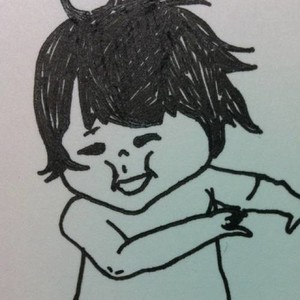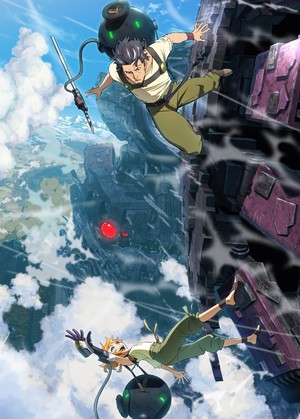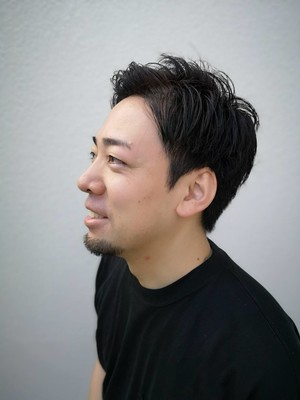Interview: Deca-dence Director Yuzuru Tachikawa and Producer Takuya Tsunoki
by Kim Morrissy,Deca-Dence is an ambitious original anime produced at NUT, the studio behind The Saga of Tanya the Evil anime. It's directed by Yuzuru Tachikawa, who is well known for directing Death Parade and Mob Psycho 100. With many members of the Death Parade team on board, as well as talented new faces, Deca-Dence already looks like it will become an impressive anime. In anticipation of the anime's incoming premiere, Anime News Network is releasing an exclusive interview with director Yuzuru Tachikawa and producer Takuya Tsunoki.
 (For Yuzuru Tachikawa) Deca-Dence is NUT's first original work and it seems pretty ambitious. The website says the story will introduce a large, unique world, moving fortresses, and giant monsters. Can you talk about the decision to create such an ambitious setting?
(For Yuzuru Tachikawa) Deca-Dence is NUT's first original work and it seems pretty ambitious. The website says the story will introduce a large, unique world, moving fortresses, and giant monsters. Can you talk about the decision to create such an ambitious setting?
As the discussions about the pitch were progressing, I was drawing images of a robot that had once been active yet is now falling into ruin. The producer who saw it said, “This story piques my interest.” So I created a setting where it's an everyday occurrence for giant beasts and moving fortresses to be in conflict.
I hardly ever get the chance to draw large-scale objects for the screen, so it's also a theme I wanted to challenge myself with. It's ambitious as an original project, and it's the type of work that has a lot of labor.
 The story is set as humans have moved to living in the 3000 meter-height giant moving fortress. Can you discuss Deca-Dence's unique setting and how the idea of moving fortresses came into the story?
The story is set as humans have moved to living in the 3000 meter-height giant moving fortress. Can you discuss Deca-Dence's unique setting and how the idea of moving fortresses came into the story?
There are mountains of stories about humanity battling against giant monsters. I wanted to make them a different group, and I made a setting where it's an everyday matter to fight the giant beasts in the Deca-Dence.
There are two types of people living inside the moving fortress: The people who specialize in combat called the Gears, and the people who don't fight called the Tankers. The Tankers are protected by the Gears, and they're also protected by thick armor. Because of this, Tankers don't have the grim resolve to fight, nor do they feel danger. Even though there are battles taking place outside against the monsters, the Tankers live and die inside the moving fortress. That's where the story begins.
What was the development process for Deca-Dence? When did the project begin and has it changed over time?
The meetings to discuss the pitch happened around 2016, but the story was completely different from what it is now. The form was changing every time we had a meeting. We settled on the current form around the summer of 2017. It takes a long while to develop the setting and characters for an original work, so I prioritized developing the script for the dramatic beats that I wanted to depict. When a draft for the script spanning the final episode was done, we would flush out the problem parts from the beginning, fleshing out the details of the setting as we went along. There are a lot of details that I can't talk about because they're still under wraps, but because the world has some very unique qualities, it's been difficult reflecting that in the design side.
I'm curious about the anime's title. In English, “Deca-Dence” can mean “extravagant” or “rich” but it also has a sense of negativity. The story of Marie Antoinette comes to mind. How does the anime's title represent the anime's theme, characters, or setting?
The themes of this anime revolve around “ruin” and “decline,” so I think it draws from the negative sense of the word. Also, in Japanese, we refer to huge things as “dekai,” so I wanted the sound of “deka” in it.
The “Dence” part is pronounced as “dance” in Japanese, but it has the same meaning as “to live.” So I wanted to convey the seemingly opposite meanings, one of which is the general meaning of “ruin” and the other is “living big.”

Your previous works like Death Parade and Mob Psycho 100 had very strong emotional themes about personal growth and accepting loss. The tagline of Deca-Dence is “It is for me to decide which world to live in." What would you say is the emotional core of Deca-Dence?
As the tagline goes, the key word of this anime is “choice.” Living is a continuation of a choice, and the result changes a lot depending on what you choose. No choice is meaningless; they are all connected. That goes hand in hand with both sacrifices and mistakes. I want to portray what happens as a result of choices.
Can we expect to see any of the animators from Mob Psycho 100 participating in Deca-Dence?
There are hardly any Mob Psycho 100 animators because the team is different. There are lots of animators who participated in Death Parade, though.
In the promotional videos, audiences have gotten a chance to see an orange-haired girl who wields some impressive tools. Can you tell us about her and what her tools are all about?
Natsume is one of the protagonists. She is a resident of a Tank city who is protected by the Gears, but she has the desire to go outside and fight alongside the Gears. She's a character who immediately acts based on her gut instincts, and she pulls the story along.
Her equipment is made for fighting Gadolls. By driving the stake into the monsters, she makes them die of blood loss. There are various forms of weapons appearing in the show.

There are still a lot of surprises left in store for viewers. Is there a moment in the series you're most excited for viewers to see?
When it comes to the footage, the battle scenes took an awful lot of time, so I really want people to appreciate them. (laughs) Deca-Dence has a lot of things to look out for, like the setting, the monster depictions, and the moving fortress. Besides that, there are lots of cute things that will appear that I can't talk about yet, so please look forward to it.
 (For Producer Takuya Tsunoki) What is the meaning and origin behind the name of Studio NuT?
(For Producer Takuya Tsunoki) What is the meaning and origin behind the name of Studio NuT?
It's because I wanted a name that is wild out and there - something that's “nuts.” It could be taken in a negative way, but in Japanese it's got the feeling of the word “yabai” (“that's crazy”, “fully sick”). I hope we can make works that are “yabai” in a good way.
Also, the meaning and sound of it is similar to “MAD,” which was my old haunt.
You were formerly a producer at Madhouse. What kind of know-how did you take from the studio during your time there?
Madhouse made all sorts of works that are different from what NUT makes right now, and because of that, I was able to witness so many different works and see so many staff members at work. Also, I think the experience I had then of deciding on a project by myself and learning to improve from it has been extremely formative to who I am now.
Many of the staff members on Deca-Dence are friends from those former times at Madhouse that we spent together through thick and thin. Meeting those people was also a big takeaway for me.
How has COVID-19 been affecting the production? What kind of difficulties have you experienced creating this anime?
The experience of working remotely was done half-forcefully, haha.
Accordingly, the digital animation and the paper animation were in a mess; thinking about the process, I realized that you really have to properly consider adopting digital animation.
Also, I got the impression that the communication within the studio tended to be lacking.
Deca-Dence will premiere on July 8. You can access the English website here.
this article has been modified since it was originally posted; see change history